专项调研-When句型
- 格式:doc
- 大小:24.50 KB
- 文档页数:2
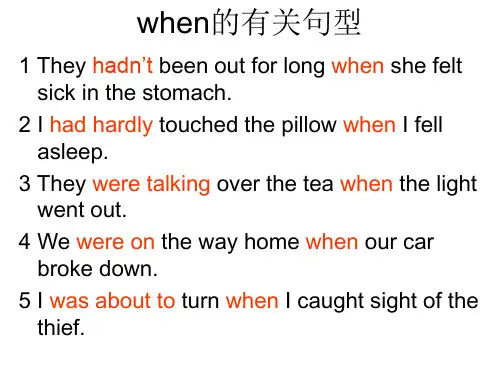
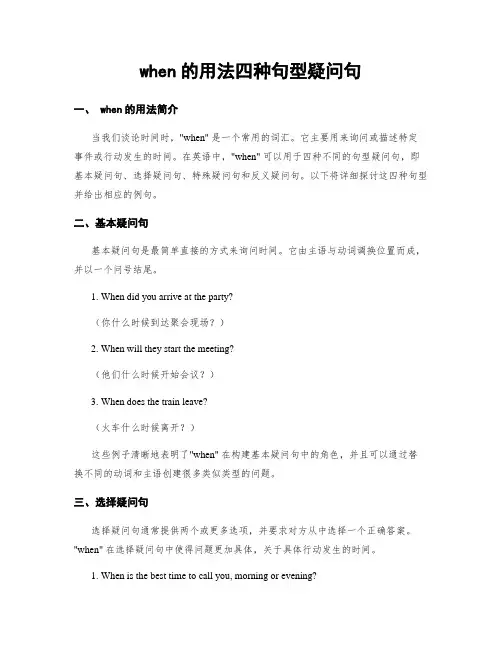
when的用法四种句型疑问句一、 when的用法简介当我们谈论时间时,"when" 是一个常用的词汇。
它主要用来询问或描述特定事件或行动发生的时间。
在英语中,"when" 可以用于四种不同的句型疑问句,即基本疑问句、选择疑问句、特殊疑问句和反义疑问句。
以下将详细探讨这四种句型并给出相应的例句。
二、基本疑问句基本疑问句是最简单直接的方式来询问时间。
它由主语与动词调换位置而成,并以一个问号结尾。
1. When did you arrive at the party?(你什么时候到达聚会现场?)2. When will they start the meeting?(他们什么时候开始会议?)3. When does the train leave?(火车什么时候离开?)这些例子清晰地表明了"when" 在构建基本疑问句中的角色,并且可以通过替换不同的动词和主语创建很多类似类型的问题。
三、选择疑问句选择疑问句通常提供两个或更多选项,并要求对方从中选择一个正确答案。
"when" 在选择疑问句中使得问题更加具体,关于具体行动发生的时间。
1. When is the best time to call you, morning or evening?(早上或晚上打电话给你最好的时间是什么时候?)2. When do you prefer to have lunch, at twelve o'clock or one o'clock?(你更愿意在12点还是1点吃午饭?)3. When would you like to schedule the appointment, this week or next week?(你希望什么时候安排见面,这周还是下周?)通过使用选择疑问句,我们可以在提供选项的基础上更进一步了解对方的偏好和时间计划。
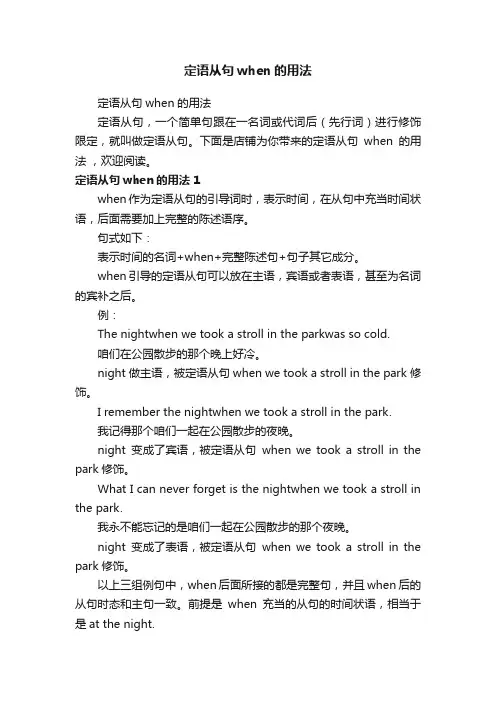
定语从句when的用法定语从句when的用法定语从句,一个简单句跟在一名词或代词后(先行词)进行修饰限定,就叫做定语从句。
下面是店铺为你带来的定语从句when的用法,欢迎阅读。
定语从句when的用法1when作为定语从句的引导词时,表示时间,在从句中充当时间状语,后面需要加上完整的陈述语序。
句式如下:表示时间的名词+when+完整陈述句+句子其它成分。
when引导的定语从句可以放在主语,宾语或者表语,甚至为名词的宾补之后。
例:The nightwhen we took a stroll in the parkwas so cold.咱们在公园散步的那个晚上好冷。
night 做主语,被定语从句when we took a stroll in the park 修饰。
I remember the nightwhen we took a stroll in the park.我记得那个咱们一起在公园散步的夜晚。
night变成了宾语,被定语从句when we took a stroll in the park修饰。
What I can never forget is the nightwhen we took a stroll in the park.我永不能忘记的是咱们一起在公园散步的那个夜晚。
night变成了表语,被定语从句when we took a stroll in the park修饰。
以上三组例句中,when后面所接的都是完整句,并且when 后的从句时态和主句一致。
前提是when充当的从句的时间状语,相当于是at the night.所以,以上三句,可以把when都改成at which。
写作必备when引导定语从句句式:There was a time when...... 曾经。
There was a time when people were never bothered by pollution.曾经人们不用为污染烦忧。
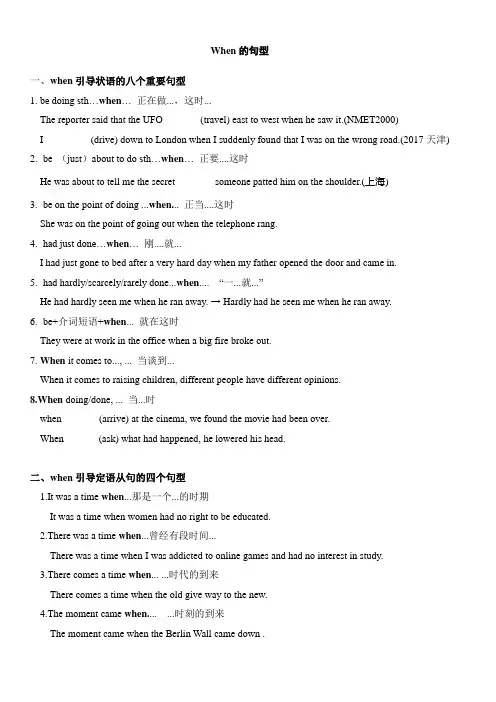
When的句型一、when引导状语的八个重要句型1. be doing sth…when…正在做...,这时...The reporter said that the UFO_______ (travel) east to west when he saw it.(NMET2000)I _________(drive) down to London when I suddenly found that I was on the wrong road.(2017天津)2.be (just)about to do sth…when…正要....这时He was about to tell me the secret _______ someone patted him on the shoulder.(上海)3.be on the point of doing ...when... 正当....这时She was on the point of going out when the telephone rang.4.had just done…when…刚....就...I had just gone to bed after a very hard day when my father opened the door and came in.5.had hardly/scarcely/rarely done...when.... “一...就...”He had hardly seen me when he ran away. → Hardly had he seen me when he ran away.6.be+介词短语+when... 就在这时They were at work in the office when a big fire broke out.7. When it comes to..., ... 当谈到...When it comes to raising children, different people have different opinions.8.When doing/done, ... 当...时when _______(arrive) at the cinema, we found the movie had been over.When_______(ask) what had happened, he lowered his head.二、when引导定语从句的四个句型1.It was a time when...那是一个...的时期It was a time when women had no right to be educated.2.There was a time when...曾经有段时间...There was a time when I was addicted to online games and had no interest in study.3.There comes a time when... ...时代的到来There comes a time when the old give way to the new.4.The moment came when.... ...时刻的到来The moment came when the Berlin Wall came down .。
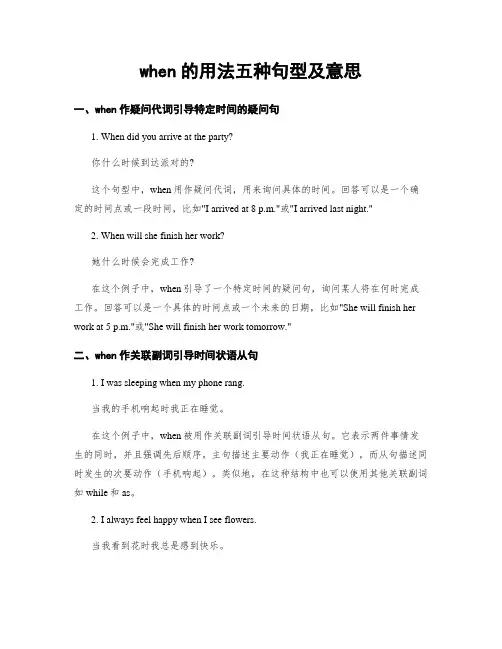
when的用法五种句型及意思一、when作疑问代词引导特定时间的疑问句1. When did you arrive at the party?你什么时候到达派对的?这个句型中,when用作疑问代词,用来询问具体的时间。
回答可以是一个确定的时间点或一段时间,比如"I arrived at 8 p.m."或"I arrived last night."2. When will she finish her work?她什么时候会完成工作?在这个例子中,when引导了一个特定时间的疑问句,询问某人将在何时完成工作。
回答可以是一个具体的时间点或一个未来的日期,比如"She will finish her work at 5 p.m."或"She will finish her work tomorrow."二、when作关联副词引导时间状语从句1. I was sleeping when my phone rang.当我的手机响起时我正在睡觉。
在这个例子中,when被用作关联副词引导时间状语从句。
它表示两件事情发生的同时,并且强调先后顺序。
主句描述主要动作(我正在睡觉),而从句描述同时发生的次要动作(手机响起)。
类似地,在这种结构中也可以使用其他关联副词如while和as。
2. I always feel happy when I see flowers.当我看到花时我总是感到快乐。
这个例子展示了when引导时间状语从句,描述在特定情况下发生的一般动作。
主句表达一个经常性的感觉,而从句则指明特定触发条件(看到花)。
在这种结构中,也可以使用其他关联副词如whenever和every time。
三、when作连词引导条件状语从句1. You will succeed when you work hard.当你努力工作时你会成功。
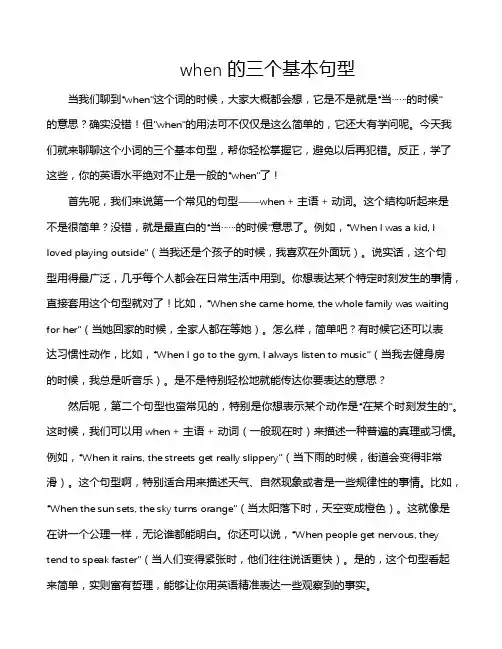
when的三个基本句型当我们聊到“when”这个词的时候,大家大概都会想,它是不是就是“当……的时候”的意思?确实没错!但"when"的用法可不仅仅是这么简单的,它还大有学问呢。
今天我们就来聊聊这个小词的三个基本句型,帮你轻松掌握它,避免以后再犯错。
反正,学了这些,你的英语水平绝对不止是一般的“when”了!首先呢,我们来说第一个常见的句型——when + 主语 + 动词。
这个结构听起来是不是很简单?没错,就是最直白的“当……的时候”意思了。
例如,“When I was a kid, I loved playing outside”(当我还是个孩子的时候,我喜欢在外面玩)。
说实话,这个句型用得最广泛,几乎每个人都会在日常生活中用到。
你想表达某个特定时刻发生的事情,直接套用这个句型就对了!比如,“When she came home, the whole family was waiting for her”(当她回家的时候,全家人都在等她)。
怎么样,简单吧?有时候它还可以表达习惯性动作,比如,“When I go to the gym, I always listen to music”(当我去健身房的时候,我总是听音乐)。
是不是特别轻松地就能传达你要表达的意思?然后呢,第二个句型也蛮常见的,特别是你想表示某个动作是“在某个时刻发生的”。
这时候,我们可以用when + 主语 + 动词(一般现在时)来描述一种普遍的真理或习惯。
例如,“When it rains, the streets get really slippery”(当下雨的时候,街道会变得非常滑)。
这个句型啊,特别适合用来描述天气、自然现象或者是一些规律性的事情。
比如,“When the sun sets, the sky turns orange”(当太阳落下时,天空变成橙色)。
这就像是在讲一个公理一样,无论谁都能明白。
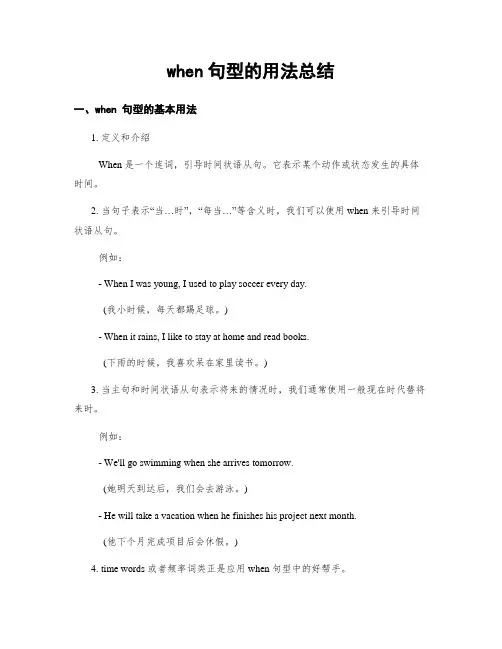
when句型的用法总结一、when 句型的基本用法1. 定义和介绍When 是一个连词,引导时间状语从句。
它表示某个动作或状态发生的具体时间。
2. 当句子表示“当…时”,“每当…”等含义时,我们可以使用 when 来引导时间状语从句。
例如:- When I was young, I used to play soccer every day.(我小时候,每天都踢足球。
)- When it rains, I like to stay at home and read books.(下雨的时候,我喜欢呆在家里读书。
)3. 当主句和时间状语从句表示将来的情况时,我们通常使用一般现在时代替将来时。
例如:- We'll go swimming when she arrives tomorrow.(她明天到达后,我们会去游泳。
)- He will take a vacation when he finishes his project next month.(他下个月完成项目后会休假。
)4. time words 或者频率词类正是应用 when 句型中的好帮手。
这些time words包括:before(在...之前)、after(之后)、as soon as(一...就)、until/till(直到、至到)和while等。
这些频率词类还包括:always(总是), usually(通常), often(经常), sometimes(有时候), rarely(很少), never(从未)等。
5. 引导时间状语从句的其它连词在 when 句型中,还有其他可以引导时间状语从句的连词,如 while(当...期间)、as(正当...时候)和 before(在...之前)。
这些连词也可以根据具体的语境来选择使用。
二、when 句型的高级应用1. 定义和介绍When 句型除了上述基本用法之外,还拥有更多复杂的表达方式,使得句子更具丰富性、准确性。
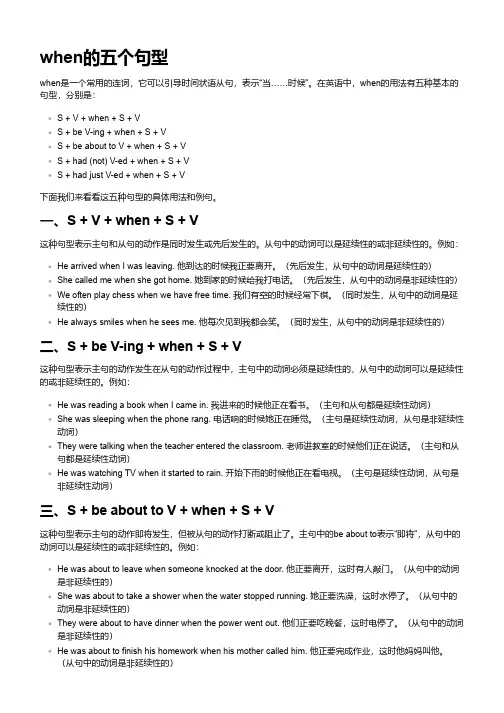
when的五个句型when是一个常用的连词,它可以引导时间状语从句,表示“当……时候”。
在英语中,when的用法有五种基本的句型,分别是:S + V + when + S + VS + be V-ing + when + S + VS + be about to V + when + S + VS + had (not) V-ed + when + S + VS + had just V-ed + when + S + V下面我们来看看这五种句型的具体用法和例句。
一、S + V + when + S + V这种句型表示主句和从句的动作是同时发生或先后发生的。
从句中的动词可以是延续性的或非延续性的。
例如:He arrived when I was leaving. 他到达的时候我正要离开。
(先后发生,从句中的动词是延续性的)She called me when she got home. 她到家的时候给我打电话。
(先后发生,从句中的动词是非延续性的)We often play chess when we have free time. 我们有空的时候经常下棋。
(同时发生,从句中的动词是延续性的)He always smiles when he sees me. 他每次见到我都会笑。
(同时发生,从句中的动词是非延续性的)二、S + be V-ing + when + S + V这种句型表示主句的动作发生在从句的动作过程中,主句中的动词必须是延续性的,从句中的动词可以是延续性的或非延续性的。
例如:He was reading a book when I came in. 我进来的时候他正在看书。
(主句和从句都是延续性动词)She was sleeping when the phone rang. 电话响的时候她正在睡觉。
(主句是延续性动词,从句是非延续性动词)They were talking when the teacher entered the classroom. 老师进教室的时候他们正在说话。
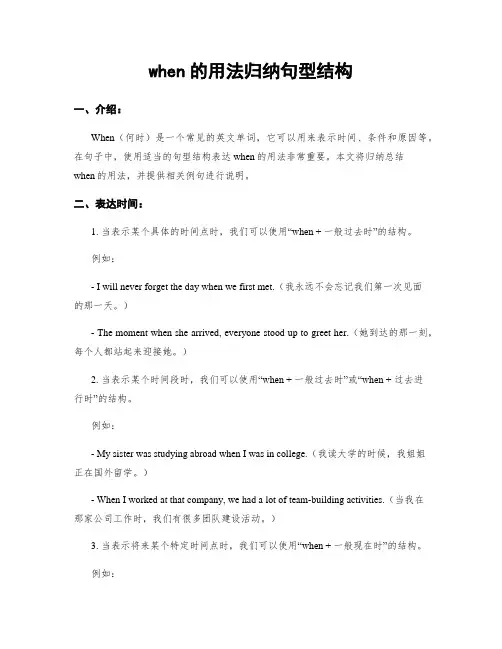
when的用法归纳句型结构一、介绍:When(何时)是一个常见的英文单词,它可以用来表示时间、条件和原因等。
在句子中,使用适当的句型结构表达when的用法非常重要。
本文将归纳总结when的用法,并提供相关例句进行说明。
二、表达时间:1. 当表示某个具体的时间点时,我们可以使用“when + 一般过去时”的结构。
例如:- I will never forget the day when we first met.(我永远不会忘记我们第一次见面的那一天。
)- The moment when she arrived, everyone stood up to greet her.(她到达的那一刻,每个人都站起来迎接她。
)2. 当表示某个时间段时,我们可以使用“when + 一般过去时”或“when + 过去进行时”的结构。
例如:- My sister was studying abroad when I was in college.(我读大学的时候,我姐姐正在国外留学。
)- When I worked at that company, we had a lot of team-building activities.(当我在那家公司工作时,我们有很多团队建设活动。
)3. 当表示将来某个特定时间点时,我们可以使用“when + 一般现在时”的结构。
例如:- Please call me on Sunday morning when you arrive in the city.(当你到达城市时,请在周日上午给我打电话。
)- When we meet next time, let's go to that new coffee shop together.(下次见面时,我们一起去那家新咖啡店吧。
)三、表达条件:1. 当表示某个假设的条件时,我们可以使用“if + 一般过去时”或“if + 过去完成时”的结构来引导从句,并在主句中使用“would/could/should + 动词原形”。
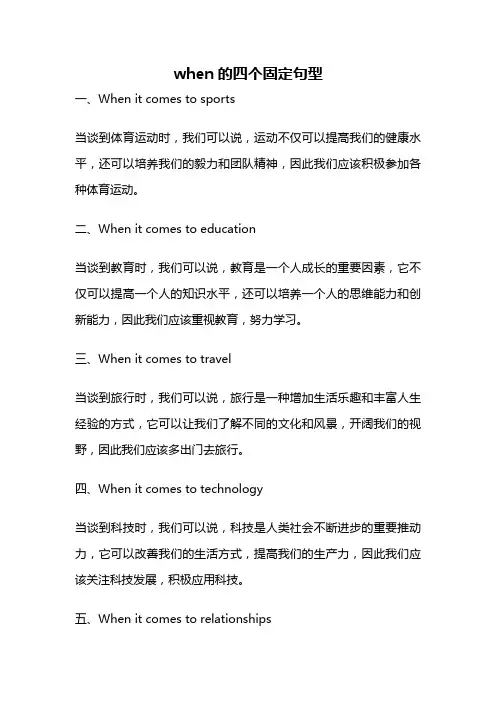
when的四个固定句型一、When it comes to sports当谈到体育运动时,我们可以说,运动不仅可以提高我们的健康水平,还可以培养我们的毅力和团队精神,因此我们应该积极参加各种体育运动。
二、When it comes to education当谈到教育时,我们可以说,教育是一个人成长的重要因素,它不仅可以提高一个人的知识水平,还可以培养一个人的思维能力和创新能力,因此我们应该重视教育,努力学习。
三、When it comes to travel当谈到旅行时,我们可以说,旅行是一种增加生活乐趣和丰富人生经验的方式,它可以让我们了解不同的文化和风景,开阔我们的视野,因此我们应该多出门去旅行。
四、When it comes to technology当谈到科技时,我们可以说,科技是人类社会不断进步的重要推动力,它可以改善我们的生活方式,提高我们的生产力,因此我们应该关注科技发展,积极应用科技。
五、When it comes to relationships当谈到人际关系时,我们可以说,良好的人际关系是我们生活中不可或缺的一部分,它可以带给我们快乐和支持,让我们更好地应对各种挑战,因此我们应该注重人际关系的建设。
六、When it comes to health当谈到健康时,我们可以说,健康是我们生活中最重要的财富,它关系到我们的生命和生活质量,因此我们应该重视健康,保持健康的生活方式。
七、When it comes to work当谈到工作时,我们可以说,工作是我们生活中必须要面对的一部分,它可以让我们实现自我价值,赚取生活费用,因此我们应该积极面对工作,努力提高自己的工作能力。
八、When it comes to finance当谈到财务时,我们可以说,理财是我们生活中必须要掌握的一项技能,它可以帮助我们更好地管理自己的财务,实现财务自由,因此我们应该注重理财,学会正确的理财方法。
九、When it comes to fashion当谈到时尚时,我们可以说,时尚是我们生活中的一部分,它可以让我们更好地表达自己,展现自己的个性,因此我们应该关注时尚,学会正确的时尚搭配方法。
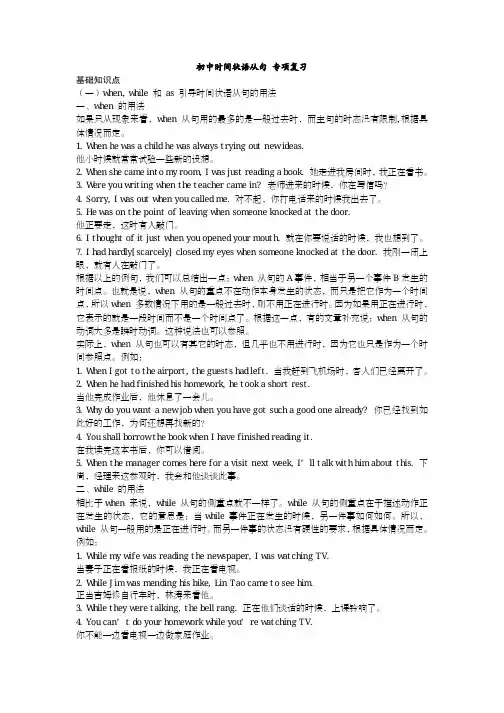
初中时间状语从句专项复习基础知识点(一)w h e n,w h i l e和a s引导时间状语从句的用法一、w h e n的用法如果只从现象来看,w h e n从句用的最多的是一般过去时,而主句的时态没有限制,根据具体情况而定。
1.W h e n h e w a s a c h i l d h e w a s a l w a y s t r y i n g o u t n e wi d e a s.他小时候就常常试验一些新的设想。
2.W h e n s h e c a m e i n t o m y r o o m,I w a s j u s t r e a d i n g a b o o k.她走进我房间时,我正在看书。
3.W e r e y o u w r i t i n g w h e nt h e t e a c h e r c a m e i n?老师进来的时候,你在写信吗?4.S o r r y,I w a s o u t w h e ny o u c a l l e d m e.对不起,你打电话来的时候我出去了。
5.H e w a s o n t h e p o i n t o f l e a v i n g w h e n s o m e o n e k n o c k e d a t t h e d o o r.他正要走,这时有人敲门。
6.I t h o u g h t o f i t j u s t w h e n y o u o p e n e d y o u r m o u t h.就在你要说话的时候,我也想到了。
7.I h a d h a r d l y[s c a r c e l y]c l o s e d m y e y e s w h e ns o m e o n e k n o c k e d a t t h e d o o r.我刚一闭上眼,就有人在敲门了。
根据以上的例句,我们可以总结出一点:w h e n从句的A事件,相当于另一个事件B发生的时间点。
定语从句中关系副词的用法关系副词,是联系先行词和定语从句的词,属于副词。
定语从句中的关系副词有三个:when, where和why,它们在定语从句中分别作时间、地点和原因状语。
其句法结构如下:1.表时间的名词+ when + 定语从句when指时间,在定语从句中作时间状语。
例句:I still remember the day when I first came to Beijing.I’ll never forget the day when I joined the army.2.表地点的名词+ where + 定语从句where指地点,在定语从句中作地点状语。
例句:The factory where his father works is in the west of the city.This is the house where I lived two years ago.3.表原因的名词reason + why + 定语从句(why只用于reason之后的限制性定语从句中,在定语从句中作原因状语。
)例句:That is the reason why I did the job.(在现代英语中why可以省略)上句也可以这样表示:That is the reason I did the job.又如:This was the reason (why )we raised the temperature.关系副词在定语从句中的用法看似简单,以下注意点不可忽视:1)“when”、“where”和“why”的运用取就于表时间的名词、表地点的名词和表原因的名词reason在定语从句中所作的成分,比较下面的几组句子:*I will never forget the day when I first met you on the beach.*I will never forget the days which/that we spent together in Xueyao Middle School.**This is the hospital where my mother works.**This is the hospital which/that we visited the day before yesterday. ***The reason why he did not go to school is that he was ill.***This is the reason which/that he gave his boss in the office .2) “when”、“where”和“why”都可以替换成“介词+ which”,介词的选用取就于先行词和定语从句中的动词。
when句式的用法一、When句式的基本用法当我们在表达时间、条件、原因等概念时,经常会使用“when”这个词来引导句子。
本文将详细介绍和解释“When”句式的用法,并提供一些例句来加深理解。
1. 表达时间通常,我们会使用“When”句式来描述一个事件在过去发生的时间点或者将来可能发生的时间点。
例如:- When I was a child, I used to play with my friends in the park every day.- I will call you when I arrive at the hotel.2. 表达条件当我们想表达某种情况下会发生的结果时,也可以使用“When”句式。
这表示只有在特定的条件满足时,才会出现后面所说的结果。
例如:- When it rains, people usually carry umbrellas.- You can go out to play when you finish your homework.3. 表达原因在表达原因时,“When”可用于引导原因状语从句。
例如:- She got nervous when she saw the spider crawling on the wall.- John couldn't focus on his work when he had a headache.二、When句式与其他从属连词的区别1. 区别于“If”当我们要表示条件时,“If”和“When”是最常见的两个词。
然而,“If”用于表示一种假设情况,而“When”则表示一种必然或常发生的情况。
例如:- If it rains, we will stay at home.(如果下雨,我们会呆在家里)- When it rains, the grass becomes wet.(下雨时,草地变湿)2. 区别于“While”另一个易混淆的词是“While”,它也可以表示时间、条件或原因。
when的用法四种句型一、基本句型:When can be used as a conjunction to introduce adverbial clauses of time. In this case, when is followed by a simple present verb tense in the main clause and a simple past verb tense in the subordinate clause. Here are some examples:1. When I go to the gym, I always stretch before exercising.(当我去健身房时,我总是在锻炼前伸展身体。
)2. I usually take a nap when I get home from work.(当我下班回家时,我通常会小睡一会儿。
)3. When it rains, I prefer to stay indoors and read a book.(下雨时,我更愿意待在室内读书。
)In these examples, when introduces an adverbial clause that indicates the time or condition under which an action takes place.二、“问答”句型:When can also be used in questions to ask about specific times or occasions. In this case, when is followed by a subject + verb in the present simple tense. Here are some examples:1. When do you usually eat breakfast?(你通常什么时候吃早餐?)2. When does the concert start?(音乐会什么时候开始?)3. When did you arrive at the airport yesterday?(昨天你什么时间到达机场的?)These questions help gather information about specific points in time or events.三、“关于过去经历”的句型:When can also be used to talk about past experiences. In this case, when is followed by a subject + past simple verb tense to describe repeated or habitual actions in the past. Here are some examples:1. When I was younger, I used to play soccer every weekend.(在我年轻的时候,每个周末我都会踢足球。
when造问句-概述说明以及解释1.引言1.1 概述当我们使用英语进行交流时,我们通常会使用问句来获取信息、表达兴趣或确认某些事情。
在英语中,有许多不同的方式来构造问句,其中一种重要的方法就是使用“when”来引导问句。
本文将重点讨论使用“when”来构造问句的相关规则和应用场景。
使用“when”造问句是指在询问某个具体的时间点或时间段时使用。
这种问句通常用于询问事件、活动或行为发生的时间。
当我们对某件事情感兴趣或需要了解某个事件发生的具体时间时,使用“when”可以帮助我们获取所需信息。
在构造“when”问句时,需要注意一些基本的语法规则。
首先,问句应该以助动词“do”或“does”作为开头,然后紧跟主语和动词原形,最后加上“when”短语。
例如,“When do you go to work?”(你什么时候去上班?)或者“When does the concert start?”(音乐会什么时候开始?)。
除了基本的语法规则外,还有一些例外情况需要特别注意。
当使用be动词时,不需要再加助动词“do”,而是直接将be动词放在开头,然后紧跟主语和“when”。
例如,“When is your birthday?”(你的生日是什么时候?)或者“When was the last time you saw her?”(你上次见到她是什么时候?)。
另外,在构造“when”问句时,需要注意使用合适的时态。
根据句子的时间参照,选择正确的时态可以更准确地表达时间关系。
常用的时态包括一般现在时、一般过去时、现在进行时等。
例如,“When do you usually have breakfast?”(你通常什么时候吃早餐?)或者“When did you start learning English?”(你什么时候开始学英语的?)。
总之,使用“when”造问句是一种常见且实用的英语表达方式。
通过掌握正确的语法规则和时态使用,我们可以更好地进行沟通和交流,更准确地了解某个事件或活动发生的时间。
when的问题分析法一、作为副词,它有以下的用法:1.作为疑问副词,引导特殊疑问句,意为“什么时候;何时”。
如:(1)When will they come back?(2)What time will they come back?回答when引导的从句,不一定指出具体的时间点。
如回答句(1)可用tomorrow,next month等。
而回答what time引导的问句,则必须说出具全的时间点,如at two o'clock,at five past ten等。
2.作连接副词,引导名词性从句或不定式,意为“什么时候”。
从句使用陈述句语序,时态根据实际情况而定。
如:(1)I'd like to know when they will come.我想知道他们什么时候来。
(when引导宾语从句)(2)Can you tell me when the bank opens?你能告诉我银行什么时候开门吗?(when引导宾语从句)(3)When she'll be back depends much on the weather.她何时回来在很大程度上取决于天气。
(when引导主语从句)(4)Have you decided when to go sightseeing?你们已经决定什么时候去郊游了吗?(when引导不定式结构)3.作疑问代词,常和介词since,till,up to等连用,意为“什么时候”。
如:(1)Since when have they had the house?他们从什么时候起有这幢房子的?(2)Till when is the library open?图书馆开放到几点呢?4.作关系副词,引导限制性定语从句和非限制性定语从句。
如:(1)The days are gone forever when the Chinese people were looked down upon.中国人民被人轻视的日子一去不复返了。
when的用法和例句when有什么时候;当 ... 时等意思,那么你知道when的用法吗?下面跟着店铺一起来学习一下,希望对大家的学习有所帮助!when的用法大全:when的用法大全:when的基本意思是“什么时候”。
可用作疑问副词,用来询问某事曾发生或将要发生的时间,引导特殊疑问句; 还可用作关系副词引导限制性定语从句、非限制性定语从句和表语从句,表示“是…时候的事”。
when的用法2:when可用作从属连词,引导状语从句,表示时间时作“当…时,在…的时候”解; 表示条件时作“如果,要是”解; 表示对比时作“既然,考虑到”解。
当when所引导的从句的主语和主句的主语一致时,常将其主语、系动词或助动词省去,只留实义动词或表语,或者改写为短语。
when的用法3:when所引导的时间状语从句用一般现在时代替将来时,用现在完成时代替将来完成时。
when的用法4:when有时也可用作疑问代词或关系代词,作介词或动词的宾语。
例如:We'll get there heaven knows when.天知道我们什么时候才能到达那里。
Next summer,by when the house should be ready.到明年夏天房子就准备好了。
when的用法例句:1. The best thing to do when entering unknown territory is smile.踏入未知地带最好的对策就是微笑。
2. When life gets hard and you want to give up, remember that life is full of ups and downs, and without the downs, the ups would mean nothing.当生活很艰难,你想要放弃的时候,请记住,生活充满了起起落落,如果没有低谷,那站在高处也失去了意义。
(八)高考专项调研When句型
A.最新高考真题
1.(全国)When does the bank close on Saturday?
A.At 1:00 pm.
B.At 3:00 pm.
C.At 4:00 pm.
2.(重庆)When did the two speakers plan to meet Jane?
A.At 2:00 .
B.At 2:15.
C.At 2:30.
B.历年高考试题经典
1.(湖南)When will they get there for the play?
A.9:00.
B.10:00.
C.10:30
2.(湖南)When will the magazine probably arrive?
A.Wednesday.
B.Thursday. C.Friday.
3.(湖南)When will the two speakers leave if they get cheaper tickets?
A.On Tuesday.
B.On Thursday.
C.On Friday.
4.(全国)When can the woman get the computers?
A.On Tuesday.
B.On Wedsday.
C.On Thursday.
5.(湖南)When will the man probably get to London?
A.At 8 o'clock.
B.At 9 0'clock.
C.At 10 o'clock.
C.命题特点分析
以when提问的问题,一般要求学生根据对话中提到的多个时间进行计算或推算从而得出问题中要求学生指出的时间。
一般这样的题目多不会直接给出题目所要求的时间,都会要求学生根据听到的内容做简单的计算。
D.一线专家命题
1.When are they going to the concert tomorrow?
A.At 6:30 am.
B.At 6:10 pm.
C.At 6:00 pm.
2.When is the live broadcast?
A.At 6:30.
B.At 7:30.
C.At 8:30.
3.When is it now?
A.In the evening.
B.At noon.
C.In the morning.
4.When will the woman take a taxi?
A.11:15 am.
B.11:00 am.
C.11:30 am.
5.When did the man have breakfast?
A.At 7:15.
B.At 7:30.
C.At 8:00 am.
6.When did the lecture probably start?
A.At 10:00 am.
B.At 9:oo am.
C.At 8:30.
7.When does the supermarket open?
A.At 8:40.
B.At 9:00 am.
C.At 10:oo am.
8.When is Jenny supposed to be here?
A.At 10:30 am.
B.At 11:00 am.
C.At 11:30 am.
9.When do the speakers plan to meet?
A.This afternoon.
B.Tomorrow morning.
C.Tomorrow afternoon.
10.When is it now?
A.8:30 am.
B.9:00 am.
C.9:30 am.
11.When is the man's flight?
A.9:oo am.
B.9:50 am.
C.9:30 am.
12.When is the last train?
A.9:48 pm.
B.10:18 pm.
C.10:50 pm.
13.When is John supposed to arrive?
A.At 7:30 am.
B.At 8:00 am.
C.At 8:15 am.
14.When did the woman call the front desk?
A.At 8:oo am.
B.At 2:00 am.
C.At 2:30 pm.
15.When should the woman hand in the project?
A.Today.
B.Yesterday.
C.The day before yesterday.
16.When is it now?
A. 3:oo pm.
B.3:30 pm.
C.6:30 pm.
17.When should the man make the call?
A.8:00 am.
B.10:00 am.
C.12:00 am.
18.When will the mother arrive?
A.At noon.
B.At 3:30 pm.
C.At dinnertime.
19.When will the speakers meet?
A.On Saturday.
B.On Sunday.
C.On Monday.
20.When will be woman get home?
A.At 5:15 pm.
B.At 5:30 pm.
C.At 5:45 pm.。